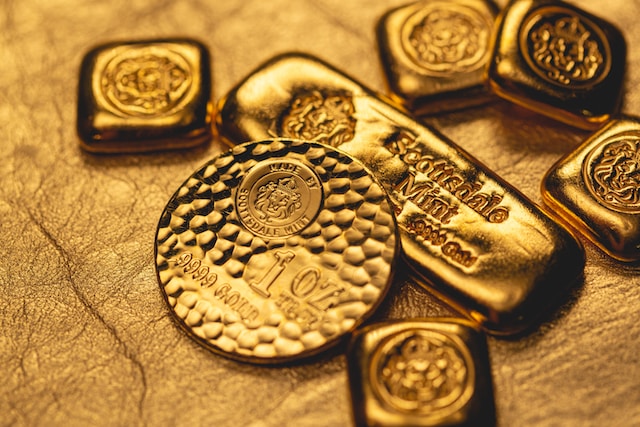If you’re looking to sell your gold in the bustling city of London, you’re in luck. With its rich history in the gold trade and thriving market, London offers numerous avenues for selling gold and maximizing your returns.
However, navigating this complex landscape can be daunting. To help you through the process, we’ve compiled a list of essential questions to consider before selling your gold in London.
Whether you’re an experienced investor or a first-time seller, this guide will provide you with the knowledge and insights necessary to make informed decisions and secure the best possible deal.
Contents
What Is The Current Market Value Of Gold?
Understanding the current market value of gold is crucial before selling your gold in London. Gold prices fluctuate regularly, influenced by various factors such as economic conditions, geopolitical events, and investor sentiment.
Stay updated on the current spot price of gold, which serves as a benchmark for transactions. Websites, financial news outlets, and reputable bullion dealers can provide real-time gold prices.
Armed with this information, you can negotiate effectively and ensure you receive a fair price for your gold.
What Type Of Gold Are You Selling?
When considering selling gold, it’s important to determine the type of gold you possess, as it can influence the selling process and potential buyers.
Here are some common types of gold that are often sold:
- Gold Jewelry:
This includes gold rings, necklaces, bracelets, earrings, and other ornamental pieces. The value of gold jewelry depends not only on the weight and purity of the gold but also on the craftsmanship, design, and any additional gemstones or diamonds.
- Gold Coins:
Gold coins are minted by various governments and are typically made of high-purity gold. Examples include popular coins like the American Gold Eagle, Canadian Maple Leaf, South African Krugerrand, and British Sovereign.

The value of gold coins depends on their weight, purity, rarity, and collector demand.
- Gold Bars:
Gold bars, also known as gold bullion or gold ingots, are typically produced by refineries or mints. They come in different weights and purities, ranging from small bars of a few grams to larger ones weighing several kilograms. Gold bars are valued based on their weight and purity.
- Scrap Gold:
This refers to any gold that is not in its original form, such as broken or damaged jewelry, dental fillings, or gold flakes. Scrap gold is usually sold to specialized gold refiners who extract the pure gold content.
Identifying the type of gold you have will help you determine the most suitable sales channel and potential buyers for your specific gold items.
Should You Sell Locally Or Online?
Deciding whether to sell your gold locally or online depends on various factors and personal preferences.
Here are some considerations to help you make an informed decision:
Selling Locally:
- Convenience:
Local options such as jewelry stores, pawnshops, or bullion dealers offer convenience in terms of proximity and face-to-face interaction. You can directly visit these establishments, discuss your gold with experts, and potentially negotiate the price.
- Instant Payment:
Selling locally often means receiving immediate payment for your gold, which can be advantageous if you need funds quickly.
- Physical Inspection:
Local buyers allow you to physically present your gold items for inspection, which may increase the buyer’s confidence and potentially lead to better offers.
- Limited Market:
Local buyers may have a smaller market reach and may not always offer the best price for your gold. It’s essential to research and visit multiple buyers to ensure you’re getting a fair deal.
Selling Online:
- Wider Reach:
Online platforms and marketplaces provide access to a broader customer base, potentially attracting buyers from different locations. This wider reach can increase the likelihood of getting competitive offers.
- Competitive Bidding:
Some online platforms facilitate competitive bidding, where multiple buyers can submit their offers for your gold. This can result in better prices as buyers compete to secure the purchase.
- Research and Comparisons:
Selling online allows you to research and compare different buyers, their reviews, and their reputation. This gives you a better chance of finding reputable buyers who offer fair prices.
- Shipping and Insurance:
When selling online, you’ll need to consider the cost and safety of shipping your gold items. Ensure that you use a reliable shipping method and consider purchasing insurance to protect your items in transit.

Ultimately, the decision between selling locally or online depends on factors such as convenience, the urgency of the sale, the size of the market, and your comfort level with online transactions.
It may be beneficial to explore both options, gather quotes, and compare offers to determine the best avenue for selling your gold.
How Can You Verify The Credibility Of Potential Buyers?
In any gold transaction, it is vital to ensure the credibility of the buyer. Here are a few that will help protect you from unscrupulous buyers and ensure a smooth and trustworthy transaction:
- Research the reputation and track record of potential buyers before making any commitments.
- Look for online reviews, testimonials, or seek recommendations from trusted sources.
- Reputable buyers should have appropriate licenses, certifications, or memberships to industry associations.
- Check if they follow established ethical guidelines and transparent pricing policies.
What Documentation Do You Need To Provide?
Prepare the necessary documentation before selling your gold in London. These may include proof of ownership, such as original receipts, certificates of authenticity, or invoices.
If you’re selling gold jewelry, provide details of the gold’s purity, weight, and any gemstones. For coins or bars, document their origin, year of production, and condition.
Having all the required paperwork ready will streamline the selling process and enhance your credibility as a seller, potentially leading to better offers.
Can You Negotiate The Price?
Negotiating the price of your gold is a common practice, especially when dealing with buyers such as jewelers or pawnshops.

Research the current market value of gold and be prepared to negotiate. Familiarize yourself with the weight, purity, and quality of your gold to establish a fair starting point.
If selling to a jeweler, they may consider factors like craftsmanship and design. Approach negotiations confidently, but be willing to walk away if the offer doesn’t meet your expectations.
Remember, obtaining multiple quotes allows for better comparison and increases the chances of securing a favorable deal.

